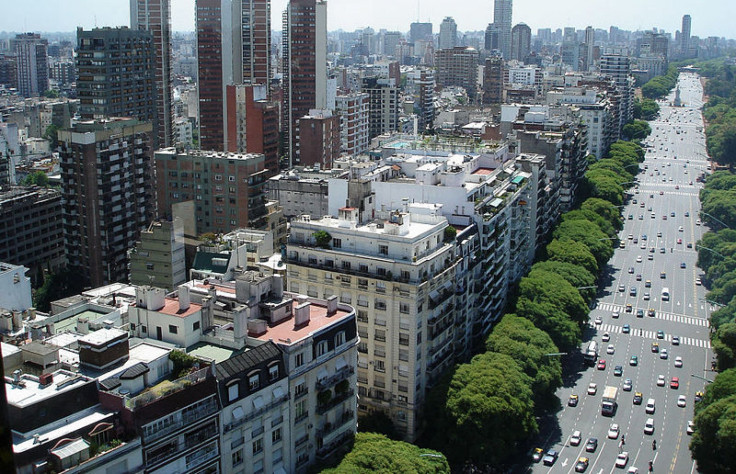Heat Wave: Argentina Reels From Power Outage, Water Shortage, As Government Blames Electricity Distributors

The austral summer is not being kind to Argentina. For the last three weeks, the South American country has suffered temperatures of at least 100 degrees Fahrenheit -- turning the capital metropolis of Buenos Aires into a hell on earth.
In connection with surging demand, power cuts and water shortages have made life worse for many throughout Argentina, and even led to three deaths of elderly citizens. Protests broke out in the capital, demanding the government take action.
The period without electrical power and water lasted for as long as two weeks. “Without water it is unbearable,” explained a citizen quoted in Euronews. “You cannot live. Above the tenth floor, within 48 hours, it’s a death trap.”
The government, however, deflected the blame to utility companies. Federal Minister of Planning and Public Services Julio de Vido urged power companies Edenor S.A. (NYSE:EDN) and Edesur to take responsibility for restoring power.
“With extraordinary temperatures over the past days, companies have not been [able to meet the demands of] Argentina’s industrial development and growth,” de Vido said in a press conference. The government even went so far as to threaten to nationalize private companies and seize control of public firms.
According to Bloomberg, Cabinet Chief Jorge Capitanich warned at a press conference: “We’ve told them emphatically that if they aren’t able to provide proper service the government will. There are no excuses.”
The electricity distributors, Edenor and Edesur, Bloomberg noted, are dependent on government money to stay in business due to fixed customer electricity prices for four years in the Buenos Aires area. In 2012, the companies received a $39 million payment from a government-controlled trust for investment.
Edenor and Edesur defended themselves by asserting that the amount of power they provide is sufficient, but that their interconnection system and infrastructure are so old and obsolete that there is no way to efficiently bring such services to the public.
The companies also complained that the government has not maintained or invested in infrastructure in the last 20 years, which means that extraordinarily high energy consumption -- on Dec. 22, Argentina recorded an all-time high demand for power -- cannot be met, causing overload on wires, which explode and cut the supply.
Indeed, neighboring Uruguay had to intervene to assist Argentina -- exporting 42 gigawatts/hour between Dec. 12 and 29 to provide relief for Argentina’s power shortage. That week made up over 45 percent of all electricity exports for Uruguay during 2013.
Gonzalo Casaravilla, president of the state-owned Uruguay electric supply, said the neighbors have had an energy exchange for the last three decades. “This is a humanitarian matter. The energy is fundamental for life and it could never be used as an advantage or bargain in a negotiation,” he said.
In the meantime, the crisis in Argentina has highlighted the current problematic economic climate in the country, which has been struggling with high inflation -- currently at 25 percent – and currency weakness against the dollar -- the Argentinean peso has declined over 20 percent since the beginning of 2013.
Making things worse, President Cristina Fernández de Kirchner has not made any public comments on the energy crisis, as she is reportedly spending the holidays in her lake house in Calafate in Patagonia in the extreme southern end of the country, where temperatures are significantly lower than in Buenos Aires.
© Copyright IBTimes 2024. All rights reserved.











